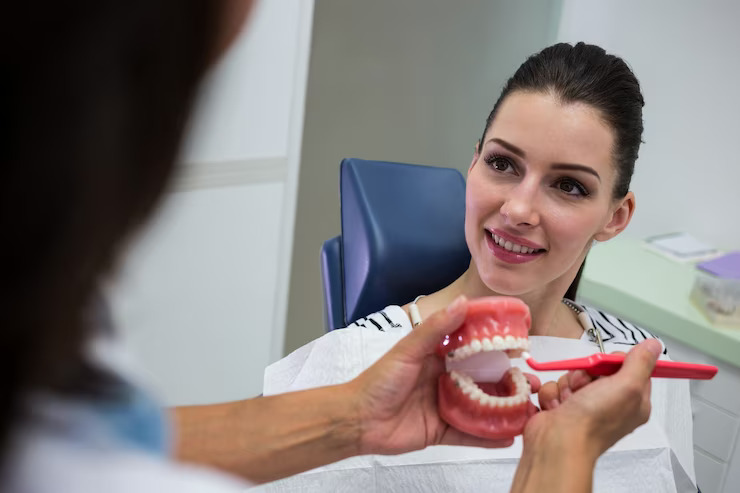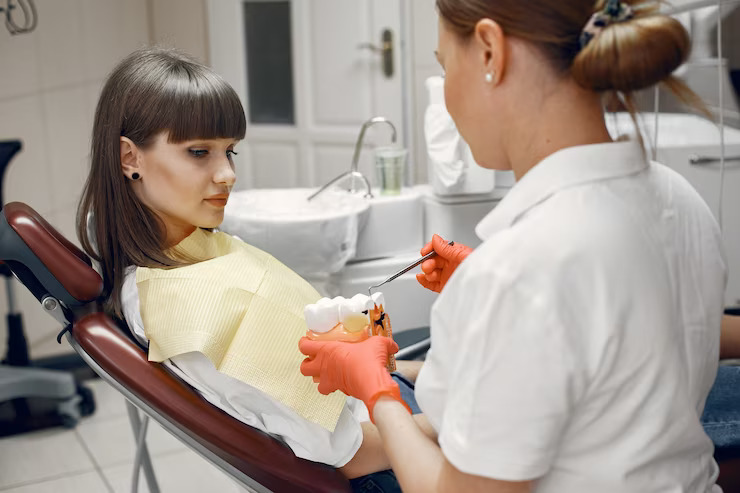Periodontal Health: A Beautiful Smile Begins With Healthy Teeth and Gums!

A healthy and beautiful smile is one of the most desirable traits for many people. While many focus on the appearance of their teeth, it’s essential to understand that healthy teeth and gums are vital for achieving that perfect smile. Periodontal health is crucial in maintaining the overall health of your mouth, and it’s crucial to understand its importance.
Without proper care, tooth decay and gum problems can lead to pain, self-confidence issues, and other challenges. Maintaining your periodontal disease treatment can help reduce the risk of serious health conditions such as heart disease, diabetes, and high blood pressure. In addition to practicing good oral hygiene, maintaining a healthy diet is also key to keeping your teeth and gums healthy.
Periodontal Disease
Periodontal disease is an infection of the gums and jawbone that can progress to more severe stages, resulting in loose or missing teeth. It can also lead to other health conditions, such as respiratory diseases and diabetes, which is why it’s important for your dentist to be an integral part of your overall health team.
People with weakened immune systems, cigarette smoking, certain medical conditions, and a poor diet are all at increased risk for gum disease. These conditions can lead to a buildup of plaque and tartar on your teeth, which are then susceptible to infection.
Gingivitis, the mildest stage of periodontal disease, is a form of gum inflammation that you can cure with proper oral hygiene, regular dental cleanings, and medication for gingivitis. Symptoms include red, swollen, and bleeding gums.
Gingivitis becomes periodontitis when it advances. This more advanced form of gum disease begins with a bacterial infection that causes an inflammatory reaction in the body. Inflammation progressively destroys the gum and bone tissue, causing pockets to develop between your teeth and gums that allow bacteria, food particles, and plaque to accumulate.
Eventually, these pockets become so large that they begin to separate your teeth from their bone. Your dentist will perform scaling and root planing and suggest antibiotic pills and medicated mouthwash for periodontal disease treatment.
During gum decay treatment, your dentist may also recommend laser therapy to reduce the size of these pockets. During this procedure, the dentist uses a laser to remove bacteria and plaque that has destroyed your gum tissue. Tissue and bone grafting can also be done to help rebuild the lost tissue and strengthen your smile.

Plaque
Everyone has plaque formation, a sticky film of bacteria that constantly forms on teeth. This plaque is harmful to a person’s oral health and can lead to tooth decay, gum disease, and other problems. The best way to fight off plaque is to brush and floss your teeth regularly. Brushing removes the food and debris that causes plaque to build up, while flossing gets rid of the sticky bacteria and plaque in between your teeth.
If you don’t follow good oral hygiene habits, plaque can become too hard to remove and turn into calculus or tartar, which can only be removed by your Boulder periodontist. Both plaque and calculus are bad for your smile, but calculus can also contribute to heart disease by increasing your risk of developing a blood clot or artery blockage.
Plaque is a thin film of bacteria that forms on teeth after meals and snacks. It contains acids that can destroy the enamel on your teeth. Repeated acid attacks on your teeth can lead to cavities and gingivitis (gum disease). When plaque isn’t brushed off and cleaned out daily, it can harden into calculus or tartar. This can cause a lot of trouble for your smile and is a leading cause of cavities and gum disease.
Plaque can also irritate the gums, making them red and swollen or even bleeding when you brush. This inflammation can also increase your risk for periodontal disease, which is a serious gum condition that leads to gum recession and bone loss. It can also put you at risk for heart disease because the bacteria in plaque can enter the bloodstream and impact your arteries. This can lead to high blood pressure and strokes.
Gingivitis
Gingivitis is a mild form of gum disease that you can reverse with better oral care. If gingivitis develops into periodontitis, it can be more serious and require additional gum decay treatment like scaling and root planing.
The condition starts with a buildup of plaque, which is a sticky film of bacteria that constantly develops around and on the teeth. When this occurs, it causes irritation to the gum tissue and can lead to redness and swelling. However, you can prevent this with regular brushing and flossing. It can also be a good idea to have semi-annual cleanings with your Boulder periodontist and hygienist to remove plaque from hard-to-reach areas.
Using the correct medication for gingivitis can help prevent gum inflammation and bleeding. Try a toothpaste that has been specially formulated to stop and deter irritated gums.
Gum disease can be linked to a number of health problems, including diabetes, cardiovascular disease, and some cancers. It can also affect a person’s overall well-being by negatively affecting their oral health and quality of life.
A variety of leading gum disease causes, such as smoking and other harmful life habits. Hormone changes like puberty, pregnancy and menopause can also trigger it. As a result, it is important to maintain a healthy lifestyle that includes regular dental visits and eating a balanced diet. Avoiding sugary snacks and drinks can also help.
If gingivitis progresses into periodontitis, it can cause a buildup of bacterial plaque in the spaces between the gum and tooth (gum pockets). Bacteria start to grow and cause infection, which can then spread down toward the root of the tooth and even destroy the bone that supports it.
Bleeding Gums
Bleeding gums may be a sign of gingivitis, a mild form of gum disease that you can reverse. It’s important to get periodontal disease treatment when this occurs because the bacteria that causes gingivitis calcifies into tartar, which can lead to gum and jaw bone loss.
The earliest stages of gum disease can be prevented with daily oral hygiene, like brushing for at least two minutes twice a day and flossing every day. Additionally, you can use mouthwash that’s formulated to fight plaque and reduce inflammation.
If you’re prone to bleeding gums, you might want to consider switching to a soft toothbrush or adjusting your scrubbing techniques. You should also be sure to check for vitamin deficiency, which is the most common gum disease causes, resulting in swollen and bleeding gums.
Stress can also increase your risk of developing bleeding gums or gum disease, so try reducing the amount of stress you have in your life. Chronic agitation and anxiety compromise your immune system, which makes it difficult for your body to fight off diseases and infections.
It’s also important to avoid smoking, as this can cause damage to your gums and teeth. To reduce your risk, stop smoking and seek support to quit. It’s also a good idea to keep your diet healthy and maintain a consistent dental care routine. You can do this by brushing twice a day with Parodontax toothpaste and flossing daily. You can also see your Boulder periodontist for regular checkups and cleanings. This will help ensure your smile stays healthy and bright!
Teeth Cleaning

If you want to maintain a healthy smile, you need to brush and floss regularly. These habits help remove plaque from the surfaces of your teeth, preventing cavities and gum disease. However, brushing and flossing are only a part of achieving optimal oral health. It is also important to visit the dentist for a regular cleaning.
A trained and experienced dental hygienist performs dental cleanings to help remove plaque from your teeth. They use special tools to clean your teeth and prevent disease effectively.
The main reason why it is important to go for dental cleanings is to avoid tooth decay, which can be very expensive and time-consuming if left untreated. Professional cleanings can also prevent gum disease, which can lead to tooth loss if not treated properly.
During the dental cleaning, your Boulder periodontist will perform an examination of your teeth and gums to make sure that there is no serious issue present. They may take X-rays to see if there is any damage to your teeth or gums. Your hygienist will use special tools to remove plaque and tartar from your teeth. This is difficult to do at home and requires the expertise of a professional.
Teeth cleaning can reduce your risk of developing diabetes, heart disease, and chronic kidney disease. Those who have their teeth professionally cleaned at least once per year have been shown to have lower blood glucose levels than those who don’t. They have also been shown to have a lower risk of strokes and heart attacks.
Conclusion
In conclusion, periodontal health is a crucial component of overall oral health and can significantly impact a person’s quality of life. With proper care, individuals can maintain healthy gums and teeth, leading to a beautiful smile and better overall health. Regular oral hygiene practices such as brushing and flossing, along with routine dental checkups, can help prevent and detect early signs of gum disease. Maintaining a healthy diet and avoiding smoking can also support a healthy oral biome. Remember, prevention is always better than cure, so prioritize your periodontal health and take the necessary steps to ensure a lifetime of healthy teeth and gums.
AUTHOR BIO
Erik Clark is the Lead Marketing Manager at Flatirons Periodontics & Implant Dentistry, a leading center for periodontics and dentistry in Boulder, CO. They are known throughout the region for creating healthy and beautiful smiles that last forever.